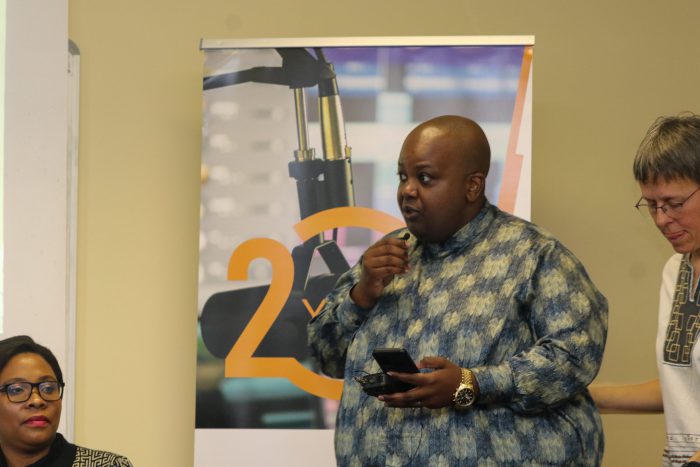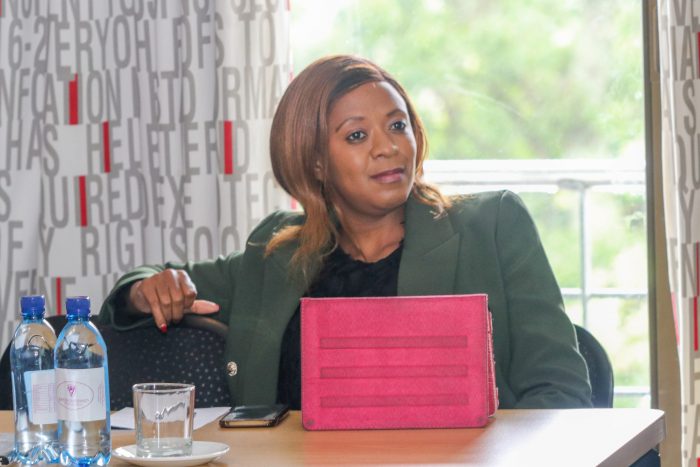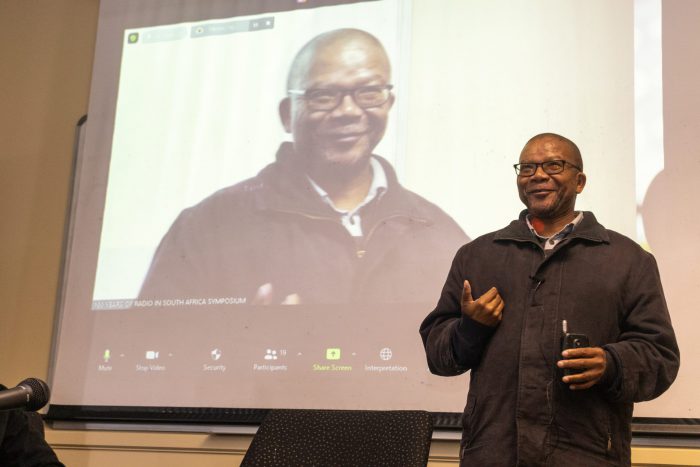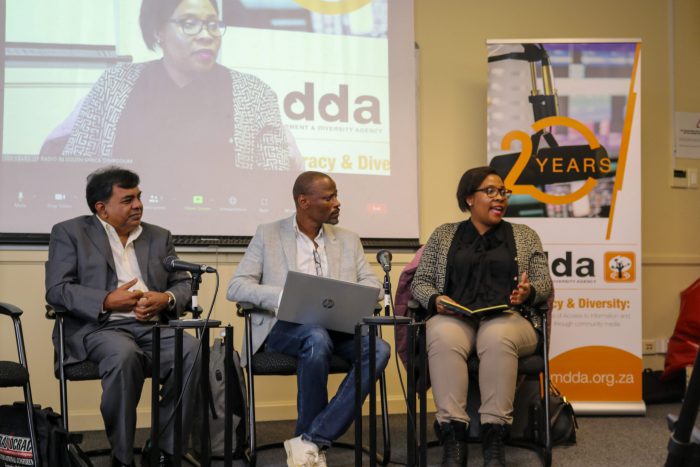By Buhle Andisiwe Made
Rhodes University’s School of Journalism and Media Studies partnered with the Media Development and Diversity Agency (MDDA) and hosted a symposium celebrating 100 years of radio in South Africa, marking the beginning of Media Freedom Week on Monday, 16 October 2023.
The event commemorated the different institutions of radio and those who have shaped and created radio into the medium it has evolved into.
A panel discussion with senior lecturer at the Cape Peninsula University of Technology, Dr Sisanda Nkoala, and North-West University Professor Gilbert Motsaathebe, editors of 100 Years in Radio in South Africa, Vol 1 & Vol. 2 sourced through the history and development of radio in the country.
Another panel member was Advocate Robin Sewlal, editor of My Radio Memory: Celebrating 100 Years in Radio in South Africa, who delivered his keynote presentation. Deputy Minister in the Presidency, Nomasonto Motaung, was in attendance and a part of the conversation.

MDDA Executive Lethabo Dibetso opened the event and informed the floor of the inception of radio through the first experimental audio broadcast at the Railway Headquarters in Johannesburg on 18 December 1923. He said, “A century on, more than 90% of South Africans over the age of 15 confirmed in a survey that they owned a radio set or had access to radio.” He adds that with 40 commercial and public broadcast stations across the country and over 200 community radio stations, radio is a significant part of South African culture – as the country’s most loved medium, with millions listening in for their beloved sounds, stories and shows.“The intimacy, immediacy and sociability of radio remain unmatched in South Africa.” Dibetso encouraged a reflection on the different impacts radio has on our society while considering the prominence of the digital renaissance. The agency (MDDA) also celebrates 20 years this year.
In his address, Adv. Sewlal defined radio as: “an impressive medium, impactful medium and influential medium.” He also informed the audience of the different timelines of radio’s beginning around the country; he adds that the different municipalities, then known as City Councils, that developed the audio broadcasts – radio’s first broadcast, as mentioned, was in Johannesburg in 1923, then in Cape Town in 1924 and then in Durban of the same year. Languages included English and Afrikaans, “With just a sprinkling of the other languages or rather other groupings in our country,” he said. Sewlal also spoke about services for Black audiences that began in the 1950s and were essentially created to pacify Black listeners – a tool used by the government to entrench the Apartheid system amongst countrymen.

According to Sewlal, among the range of radio sectors, the most transformed is the community radio sector in the media industry. Sewlal then introduces the term of Radiocracy – embodying radio, democracy, and development, conceived by a gentleman named John Hartley after a Commonwealth Press Union conference in Cape Town. Through institutions, Sewlal saw it fit to introduce radio and encourage Radiocracy within communities and institutions.
My Radio Memory, a book by Adv Sewlal, was conceptualised throughout 2022 while on a panel with Prof. Motsaathebe to commemorate the 100 years of radio. The book brings contributions from 100 listeners around the country. “Our celebration of the 100 years of radio is not just about you or me; it’s not just about the contributors; it’s about South African society,” Sewlal emphasises that South Africans and other minority groups should be adequately catered for and educated to have a more inclusive and literate society.
Dr Nkoala mentions that the series of books 100 Years in Radio in South Africa, Vol.. 1 & Vol. 2, has been compiled by practitioners and academics from the country to deliberate the place of radio in South Africa. The book is to be used as a tool, publicly accessible resources developed by historians and linguists, adding to the information compiled. This would be beneficial for educators and community initiatives.
Motaung closed off the symposium and congratulated the School of Journalism and Media Studies on their celebration of the centenary of broadcasting. The minister highlighted that introducing audio broadcasting in South Africa was a game changer, bringing together diverse cultures. Furthermore, Deputy Minister Motaung mentions: “Radio has become a source of information, entertainment, and connection. It was the nation’s voice resonating with people from all walks of life.” The minister praises the persistent legacy of radio in South Africa, recognising the dedicated journalists, broadcasters and storytellers who’ve shaped the radio landscape.

Shepard Mati, Audio lecturer and organiser, was proud to bring such a dialogue to the university and enthusiastic about the future of radio in the country. Mati mentioned that the Rhodes University motto, “Where Leaders Learn”, has been transformed by the student body to: “Where learners lead”, creating a space for students to come to the fore.


